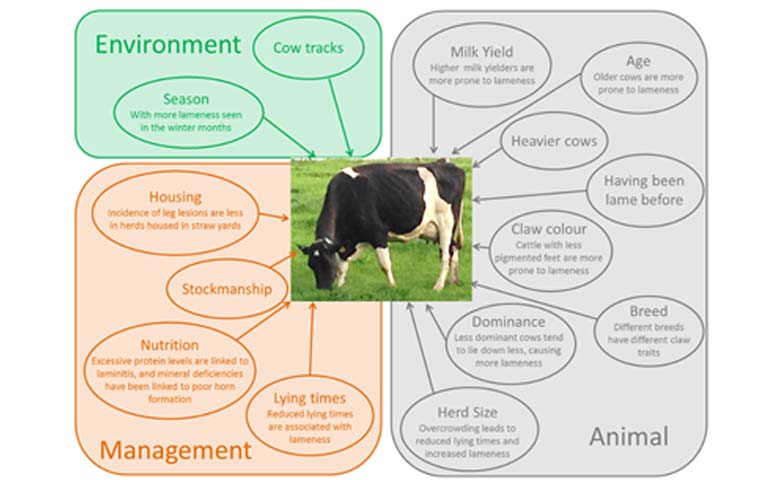Writing By: Sadaf Faiz, Dr. Aisha Khatoon , Department of Pathology, University of Agriculture Faisalabad, Pakistan
Pakistan’s bovine industry faces a multitude of challenges, primarily due to resource scarcity, inadequate infrastructure, and limited veterinary services in certain regions. These challenges not only impact the health and productivity of cattle but also have far-reaching economic and social implications.

Health Challenges in Bovine Population
Disease prevalence remains a significant concern, with ailments such as Foot-and-Mouth Disease (FMD), brucellosis, and mastitis posing persistent threats to cattle health. These diseases lead to economic downturns for farmers due to reduced milk production and compromised animal welfare, affecting the livelihoods of communities reliant on cattle farming. The management of disease dynamics requires a multifaceted approach that emphasizes the importance of accessible veterinary services. However, accessibility remains a major concern in rural areas, resulting in delayed treatments and uncontrolled disease transmission. Strengthening veterinary networks and implementing comprehensive outreach programs is crucial to effectively contain and manage disease outbreaks.
Vaccination Strategies and Educational Initiatives
Incomplete vaccination coverage leaves cattle vulnerable to preventable diseases. Establishing robust vaccination programs, coupled with educational campaigns, becomes imperative. Educating farmers about the significance of vaccinations and ensuring easy access to vaccines are critical steps toward disease control and prevention.
Challenges in Dairy Production
Nutritional deficiencies resulting from inconsistent access to quality feed have a profound impact on milk production and overall cattle health. Guiding farmers on balanced diets and efficient feeding practices is essential to optimizing milk output. Furthermore, limitations in accessing superior breeds hinder the potential for increased milk and meat yields. The introduction of advanced breeding technologies, such as artificial insemination, holds promise for significantly enhancing productivity. Inadequacies in infrastructure, such as insufficient shelters, inadequate water sources, and storage facilities for feed, compromise the health and productivity of cattle. Investment in rural infrastructure is imperative to ensure livestock well-being and boost dairy output.
Market Instability and Price Fluctuations
One of the prominent drawbacks is the lack of stable market conditions for dairy products. Market fluctuations and price instability affect farmers’ incomes, leading to uncertainty in planning and investment. This volatility stems from various factors, including changes in demand-supply dynamics, seasonal variations in milk production, and inadequate market infrastructure. These fluctuations often result in reduced profitability for dairy farmers, impacting their livelihoods and discouraging further investment in the sector.
Quality Control and Standards Compliance
Ensuring consistent quality standards across dairy products remains a challenge. Inadequate quality control measures and adherence to standards lead to variations in product quality and safety. This not only affects consumer confidence but also limits the industry’s potential to access international markets due to non-compliance with global quality standards and regulations. Strengthening quality control mechanisms and implementing stringent standards are essential to enhancing the reputation and competitiveness of Pakistani dairy products in both domestic and international markets.
Technology Adoption and Modernization
Limited adoption of modern technology and practices in dairy farming hampers productivity and efficiency. Many farmers still rely on traditional methods, resulting in lower yields and higher production costs. Access to modern technologies for breeding, feed management, milk processing, and storage facilities remains restricted in many regions. Encouraging the adoption of advanced technologies and practices through training programs and incentives can significantly improve productivity and profitability within the industry.
Environmental Sustainability
Environmental sustainability is another concern within Pakistan’s dairy sector. Inefficient waste management practices, including improper disposal of animal waste and effluents from dairy farms, pose environmental risks such as soil and water pollution. Implementing sustainable farming practices, promoting efficient waste management systems, and encouraging eco-friendly approaches in dairy farming are essential to mitigating environmental impacts and ensuring long-term sustainability.
Lack of Financial Support and Credit Facilities
Limited access to financial support and credit facilities acts as a barrier for small-scale dairy farmers to invest in modernization and expansion. Insufficient access to affordable credit inhibits their ability to purchase high-quality breeds, modern equipment, and to improve infrastructure. Expanding financial inclusion and providing tailored financial support programs for smallholder farmers can empower them to invest in better practices and technologies, ultimately enhancing productivity and income generation.
Holistic Approach to Address Challenges
A comprehensive approach is crucial to effectively tackling these challenges. Governmental initiatives focusing on widespread vaccination programs and policy reforms supporting modern farming practices and infrastructure development play a pivotal role. Collaborating with NGOs to educate farmers on disease management, nutrition, and improved farming techniques while facilitating access to better breeds and rural infrastructure development is instrumental.
Enhancing market access and ensuring fair prices for dairy products, accompanied by consumer education on sustainable dairy practices, can significantly bolster the economic viability of cattle farming. Equipping farmers with modern farming knowledge, balanced nutrition information, and effective livestock management techniques through workshops and training sessions becomes pivotal.
Future Prospects and Conclusion
Addressing these drawbacks and challenges within Pakistan’s dairy industry will require a coordinated effort involving policymakers, industry stakeholders, and support from various sectors, and Pakistan can fortify its dairy industry. This not only ensures the well-being of farmers but also contributes significantly to national economic growth and food security. Overcoming these challenges collectively will pave the way for a more sustainable and prosperous future for Pakistan’s bovine health and dairy production sectors.